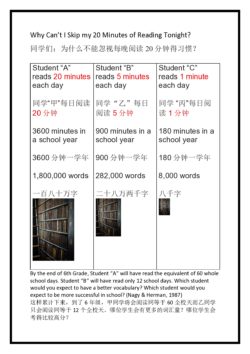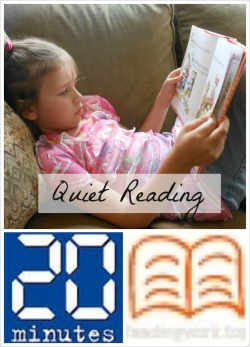READING research
How important is daily reading? According to American researchers (Nagy & Herman,1987), if your kid starts reading daily for 20 minutes from kindergarten, he/she would be exposed to 1.8 million words by the time they enter Grade 6. Reading is important to building vocabulary in reading passages and fluency. For your convenience, I have included a table in both English and Mandarin.

Research findings
Their studies find that students who scored 90% or more than their peers on reading comprehension read more than 20 minutes a day. See ” Student A” example.
Students who score 50 percentile read on average 4.6 minutes a day, building up to 282,000 words a year. See ” Student B” example.
As for students who don’t pass their reading tests, they read less than a minute a day thus they can only reach 8,000 words a year. See “Student C ” example. For Student C to catch up to Student A’s level, they have to take a year to read as many words as a Student A would read in two days.
Is reading daily enough?
Naturally, many schools implemented daily or weekly silent reading for kids from 10 minutes to 20 minutes in the classroom. But one would wonder,as long as they read 20 minutes a day, is it effective to let the child score high on reading tests?
Imagine a child who is forced and bribed into reading after a long day at school. He barely has enough time to eat and shower, let alone read a boring,difficult text which doesn’t make sense. Naturally the quality of reading 20 minutes isn’t going to help to put the child in a 90% percentile.
Compared to a child who thinks books are wonderful and enjoy the story line. When reading, he can imagine the picture that the author paints in the book vividly in his mind. He/She can feel the character’s emotions in the book. In this context, the child is likely to understand and absorb the 20 minutes of reading thus expanding vocabulary.
There are three tips to raising enthusiastic readers :
1. Reading aloud – the more words he/she hear, the bigger vocabulary will be. If a child is in a EFL (English as a Foreign Language) environment, allow the child to listen to audio books before reading aloud by him/herself.
2. Pick a book suitable to the child’s reading level and interest– if the child is forced to read something boring or takes too long to finish a page with too many difficult words, he/she will not understand what is being read. It is better to read a simpler book and appreciate the author rather than attempt a book that makes no sense after reading. Of course, I’m not suggesting that kids read magazines or comics or over simplified books just to fulfill their 20 minutes daily reading task. To learn how to choose a good book for your child, please refer to my previous post.
3. Summarize reading in own words – a child must be able to share what they read. For young readers, they can tell their parents what the story is about, who are the good or bad guys. As the reader matures, he/she must have their own opinion of what the issues in the book is reflecting and what they think of it.
All in all, for your child to succeed academically, commit to giving them twenty minutes of quality reading daily. By reading every day, they will be empowered with the tools, skills and confidence to do well in school.
For the Mandarin Version, please go to my blog.

